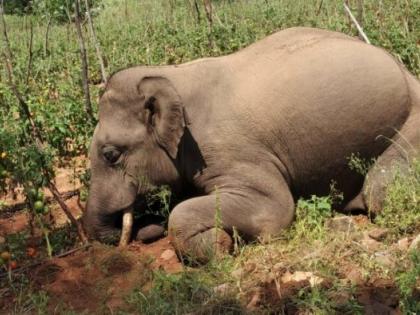Mounting Ratio of Elephant Deaths in Karnataka, An Issue Of Concern, 287 Reported Dead Since 2021, Including Seven In 2024
By Anubha Jain | Updated: June 25, 2024 18:12 IST2024-06-25T18:05:06+5:302024-06-25T18:12:14+5:30
The state of Karnataka is home to 6395 free-ranging elephants. The state has lost 287 wild elephants since 2021, ...

Mounting Ratio of Elephant Deaths in Karnataka, An Issue Of Concern, 287 Reported Dead Since 2021, Including Seven In 2024
The state of Karnataka is home to 6395 free-ranging elephants. The state has lost 287 wild elephants since 2021, including the death of seven elephants this month. Natural deaths of elephants are well within the average mortality rate of 1.8% of the population. According to the forest department, electrocution near farms and coffee estates resulted in the death of 48 elephants; five elephants were shot dead; two died in a road accident, and one in a train accident. The death of 38-year-old Ashwathama in Mysuru was due to electrocution. Between January 2021 and June 2024, Karnataka has lost 35 elephants to electrocution. The department should work towards eradicating incidents of illegal power tapping to reduce elephant deaths due to electrocution,” said Ramesh Belagere, a wildlife researcher at the Foundation of Ecology and Education Development.The High Court of Karnataka has taken up a Suo motu case against the increase in unnatural deaths of elephants in Karnataka. About 57 elephants died because of unnatural reasons. Activists are demanding the department’s probe in said direction.
The majority of deaths are being reported in the protected areas. Among these elephants the highest 99 deaths were reported in Chamarajanagar Circle; 97 in Kodagu Circle and other regions like Mysuru, Hassan, Shivamogga, Mangaluru, Bengaluru, and Chikkamagaluru where elephant deaths are frequent. Recently in April 2024 one elephant was discovered deceased in the Cauvery River that flows through the Gopinatham forest, situated on the border between Tamil Nadu and Karnataka. Wildlife activists said that wild elephants are in perilous danger especially in and around the city. Illegal traps pose a threat to these animals.
Also Read: Elephant Found Dead in Tamil Nadu: Extreme Heatwave Probable Reason
The issue of distress is that among 280 deaths uploaded on the department’s website, the post-mortem reports of 152 death cases have not been uploaded. Despite the High Court order of 2008 which made conducting the post-mortem of all elephant mortality compulsory, still 45% of the post-mortem reports since 2021 are uploaded on the official department’s website. Among the available reports, officials couldn’t give conclusive reasons for the death as in many cases the carcass of the animal was found 10 to 45 days after death. According to reports it has been found that if the post-mortem fails to give conclusive evidence officials declare it as “death due to natural reasons”.BM Chandra Naik, a veterinary scientist who conducted post-mortems of several wild elephants said if the body of the animal is fresh then it’s easier to find the cause of death. An elephant’s carcass starts decomposing within three to four days of the death.
Principal Chief Conservator of Forests (Wildlife) Subhash Malkhede said, “We are committed to transparency. Our teams search the carcasses and find out the reason for death swiftly. Post-mortem is conducted within 24 hrs. and we upload the report on the website as we receive it.” He further said that any delay may be due to the necessary time taken to compile and verify detailed and accurate reports from various locations. Activist Joseph Hoover said, “The department has to work transparently to examine each death and come up with long-term measures to avoid a bigger crisis.”
Also, jumbos consume about 10% of their body weight each day, half of which comes from grass. Other than that they depend on leaves, fruits, bamboo and other protein materials. Officials said it is impossible to take care of the large animals in such numbers. “We can provide water but supplying large amounts of grass every day to a free-ranging animal is not possible. Protecting the habitat is the only solution,” a senior official said.Activist Joseph said that the forest department needs to take mitigation measures and work with people to avoid further deaths.
Open in app